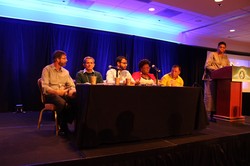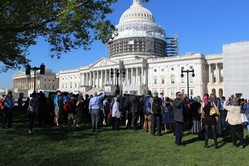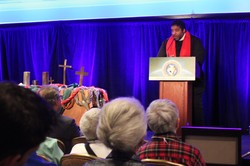Picking up where Compassion, Peace and Justice Training Day left off, approximately 200 Presbyterians joined Christian counterparts from other denominations in Washington, D.C. for Ecumenical Advocacy Days, an opportunity to explore, discuss and challenge the issues of racism, class and power.
The annual gathering of more than 60 sponsoring faith communities and organizations, works to “strengthen the Christian voice and mobilize for advocacy on specific U.S. domestic and international policy issues.” This year, organizers brought in speakers from across the U.S. and other countries to share the challenges they face in human rights, job and food security and the corporate power connected with many of these issues.
John McCullough, president of Church World Service, opened the meeting. “Lift Every Voice is about making sure everyone’s voice is heard. We need to make sure that our hopes and dreams have the possibility of one day being truly realized. We are here because our faith demands this of us.”
The Rev. Dr. William Barber, president of North Carolina NAACP and convener of Forward Together Moral Movement, challenged the crowd to speak up.
“I believe God is calling us now. That’s why many of you can’t sleep at night. It’s time to move to the public square and reclaim God’s moral language,” he said. “We need a moral movement in this country and world that claims higher ground. Too many have been seduced to be political instead of Christian. We don’t use language of the church but instead use terms like ‘left versus right’ or ‘conservative versus liberal.’ We can no longer allow people to engage in the theological square and hijack the gospel.”

(left to right) Hunter Farrell, director of World Mission with the Presbyterian Mission Agency; Conrado Olivera of Joining Hands Peru; Esam Boraey, human rights activist; Samantha Master of Black Lives Matter; Frances Bagotlo Laminero of InPeace in the Philippines; and Moderator the Rev. Traci Black —Rick Jones
During the two-day conference, attendees participated in workshops and plenaries around advancing human rights in a time of fear, immigration and racism, environmental justice and voting rights.
Ellen Buchman, executive vice president for field and communications with the Leadership Conference on Civil and Human Rights, led a workshop on the struggle for voting rights. Buchman noted 2016 will be the first presidential election year in 50 years in which voters will not be protected by the 1965 Voting Rights Act (VRA), portions of which were struck down by a 2013 Supreme Court decision.
As a result, North Carolina rolled back many provisions that make it easier for people of color to participate, and Maricopa County, Arizona closed specific polling places in a cost-saving maneuver. With a fully intact Voting Rights Act, the state and county would be required to prove that modifying procedures or closing locations is not discriminatory. Buchman urged participants to lobby their representatives on behalf of the Voting Rights Advancement Act, which doesn’t have a voter ID requirement attached to the current bill before Congress. She provided attendees a VRA Action Toolkit, a resource that offers key messages and talking points, letter to the editor templates, social media guidance and much more for helping advocates restore the VRA.
This was the 14th annual gathering for Ecumenical Advocacy Days. Presbyterian leaders say it’s important to bring faith groups together.

Participants of Ecumenical Advocacy Days gathered on Capitol Hill for prayer before meeting with their congressional representatives. —Rick Jones
“It’s the church being church. It’s where our differences in doctrine are set aside for a common commitment to justice and peace,” said Sara Lisherness, director of Compassion, Peace and Justice. “It’s where we can bring together a far greater voice that any denomination or Christian organization can be involved with.”
The Rev. Dr. J. Herbert Nelson, director of the Office of Public Witness says the church has a long history of engagement with EAD.
“Justice work is in the DNA of Presbyterians. It is not somehow a coincidence that we do this kind of work,” he said. “We have been found on the principle that we do this for more than just ourselves. It is something we have been doing since the founding of the Presbyterian church by John Calvin. Stop and read Jesus and if you do that long enough, you will understand why we do what we do.”
The conference ended with a visit by faith groups to Capitol Hill to meet with and lobby congressional representatives on a number of social justice issues.

